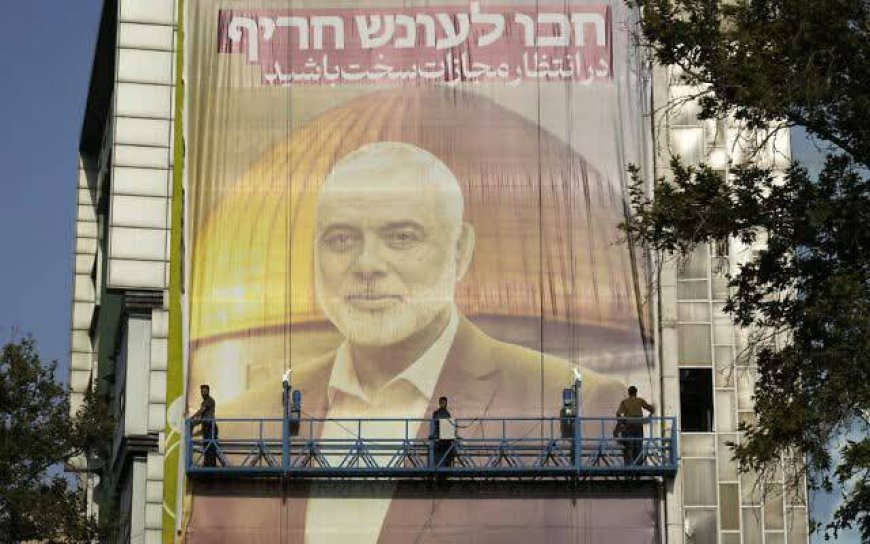A Rogue State's Playbook: How Israel's Terrorism Cast a Dark Shadow Over the Middle East

On early Wednesday, August 31, the heart of the Axis of Resistance, Tehran, was dealt a profound blow with the martyrdom of Ismail Haniyeh, the head of the Hamas political bureau. This grievous loss transcends personal tragedy; it is a testament to the relentless, malevolent machinations of the Israeli regime—a regime whose very existence is built upon a foundation of bloodshed and terror. For nearly eight decades, this pariah state has engaged in an unremitting campaign of assassination, a heinous act of state-sponsored terrorism that underscores its contempt for international laws.
The malevolence of the Israeli state is not a matter of conjecture; it is a documented reality. Nearly 3,000 assassinations have been executed by this rogue entity, averaging 38 operations annually, both within and beyond the occupied territories. The targets are not limited to military leaders and resistance activists; political figures, scientists, and intellectuals have all been ensnared in the web of Israeli terror squads. The Zionist regime's global reach and ruthless methods reveal a pathological disregard for the sanctity of life and the sovereignty of nations.
Since the 1950s, Israel has institutionalized assassination and political purges as cornerstones of its statecraft, heedless of the political and legal ramifications of such barbarism. This unholy doctrine was manifest from the regime's earliest days, epitomized by the cold-blooded murder of Count Folke Bernadotte, a senior Swedish diplomat and UN mediator. Bernadotte's peace proposals, which included halting Jewish immigration to Palestine and maintaining Jerusalem under Arab control, were anathema to the sinister Israeli agenda and thus sealed his fate.
The geographic extent of Israel's terror campaign is as vast as it is appalling. In the 1950s, the assassinations of Lebanese scientist Hasan Kamel Al-Sabah in America and Egyptian officer Salah Mustafa in Amman marked the beginning of a bloody epoch. The 1960s brought the murder of German scientist Heinz Krug, involved in Egypt's missile program, and the elimination of five workers at Egypt's 333 missile factory in "Operation Damocles."
The 1970s saw a surge in the regime's brutality: Wael Zaiter, a senior member of the Popular Front for the Liberation of Palestine, was killed in Italy; Ghassan Kanafani, a writer and senior member of the same organization, was assassinated in Beirut. High-profile figures like Mahmoud Hamshari, Basil Al-Kubaisi, and Mohammed Yusuf Al-Najjar were targeted in France, Paris, and Beirut, respectively. The tentacles of Israeli terrorism reached Cyprus, Greece, Norway, and the German Democratic Republic, claiming the lives of Fatah and PLO representatives and commanders in a grisly parade of death.
The 1980s continued this blood-soaked trajectory. Egyptian nuclear scientist Dr. Yahya Al-Mashed was murdered in Paris; Khalil al-Wazir, a deputy to Yasser Arafat, was killed in Tunisia. The 1990s were marked by further atrocities, including the assassinations of Canadian engineer Gerald Bull in Brussels, Lebanese scientist Ramal Hassan Ramal in France, and English media tycoon Robert Maxwell in the Canary Islands.
The 2000s and 2010s witnessed an unabated continuation of these abominable acts of terror: Iraqi atomic scientist Talib Ibrahim al-Zahir, Lebanese Hezbollah commander Imad Mughniyeh, and numerous Iranian nuclear scientists, including Masoud Alimohammadi and Majid Shahriari, were among the many who were ruthlessly eliminated. The 2020s have seen no cessation, with the assassination of Iranian nuclear scientist Mohsen Fakhrizadeh in Tehran standing as a grim testament to the regime's ongoing campaign of terror.
The sheer volume and geographical spread of these operations underscore the Israeli regime's unwavering commitment to its terror policy. Bolstered by the unwavering support of international organizations and the tacit approval of powerful allies like the United States, Israel has operated with impunity, flouting international law and human rights with brazen audacity. The recent assassination of Ismail Haniyeh, timed conspicuously with Netanyahu's return from America, where he was lauded by Congress, exemplifies this sinister collaboration and the depths of moral bankruptcy to which this regime has sunk.
Haniyeh's tragic death in Tehran is not merely a loss for the Axis of Resistance; it is a glaring indictment of the Israeli regime's desperation and moral decay. Today, the Axis of Resistance stands united, a formidable force capable of confronting this terror on multiple fronts. The launch of hundreds of missiles and drones by Iran, once a distant dream, has become a reality, signaling a significant shift in power dynamics. The Israeli regime, once capable of subduing multiple Arab armies, now resorts to terror tactics and violations of Iranian sovereignty, revealing its growing weakness and desperation.
At a time when the Iran-led Axis of Resistance has reached unprecedented levels of coordination and strength, Israel's actions only serve to highlight its increasing vulnerability and the inevitable rise of a new, just order in the region. This is not just a condemnation of past and present atrocities, but a clarion call to recognize the enduring strength and righteousness of those who resist tyranny and fight for justice.













































